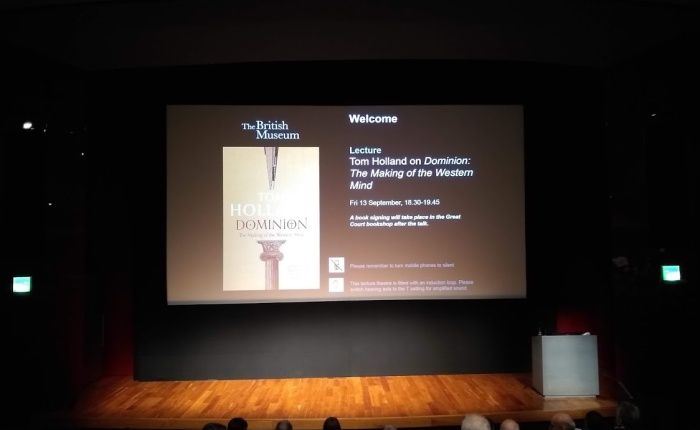In a recent post it was argued that to have objective meaning in life, it is sufficient that there be intrinsically good activities we can pursue. Naturally, for theists the question arises, how can there be intrinsically good things without God? Doesn’t the very concept of goodness require grounding in God?
Most Christians would say yes, we can’t make sense of goodness, or indeed any objective moral values* without God. Even many atheists are happy to concede that moral realism (as it is known) seems to require a transcendent source. Moore’s Open Question Argument showed that moral properties could not be natural properties, leading atheists to deny moral properties exist. For example, Mackie states that “moral properties constitute so odd a cluster of qualities and relations that they are most unlikely to have arisen in the ordinary course of events, without an all-powerful god to create them”. As an atheist, Mackie concludes that there are no objective moral values .
In recent years, though, some philosophers have put forward non-natural, non-theistic versions of moral realism. For example, Erik J. Wielenberg believes that some ethical truths are necessary truths, that they are “fundamental features of the universe that ground other truths”. According to Wielenberg, some ethical truths don’t need to be grounded in God. They are simply brute facts – facts without explanation – that we have to accept. As non-natural facts, they are sui generis, in a class of their own.
Surprisingly, this view also finds some support from theists. For example, philosopher Richard Swinburne states that “fundamental moral principles must be (logically) necessary”. William Lane Craig concurs: “I agree wholeheartedly with Swinburne that some moral truths are necessary truths”.
Craig’s statement is initially puzzling, given that he is the champion of the moral argument that has as its basis the premise that if God does not exist, objective moral values do not exist. But how can this be the case if there are necessary moral truths? Surely necessary moral truths are not dependent on the existence of God?
Craig’s position is that necessary truths still require an explanation. He quotes Shelly Kagan’s The Limits of Morality: “unless we have a coherent explanation of our moral principles, we don’t have a satisfactory ground for believing them to be true”. So Craig is arguing that Wielenberg needs to explain why there are some necessary ethical truths. Without such an explanation, we have no reason to believe these truths.
In effect, Craig’s argument is that while there are necessary ethical truths, there are no necessary ethical truths that have no explanation, i.e. brute facts.
This is redolent of the Principle of Sufficient Reason (PSR), which states that for every fact F, there must be an explanation why F is the case.
There are two issues for Craig, though, regarding the PSR. The first is that the PSR is usually restricted to contingent truths, not necessary truths. Contingent truths are those truths that could have been false. If the PSR does not apply to necessary truths, then we can’t insist that necessary ethical truths require an explanation. Secondly, the PSR is controversial and is not accepted by many philosophers. Consequently, it is not particularly helpful in strengthening Craig’s demand for explanation, as it requires its own detailed justification.
Craig does, however, seem to have a point. If the necessity of certain ethical truths can be better explained with theism, perhaps this view should be preferred over non-theistic alternatives such as Wielenberg’s. Craig uses the example of “2+2=4” being a necessary truth that is grounded in Peano’s axioms, the set of statements that define the properties of natural numbers.
What then is Craig’s explanation for necessary ethical truths? Unsurprisingly, he thinks they are grounded in the necessary existence of God. Because God necessarily exists, certain ethical truths also necessarily exist. There are complications with this relationship, though, and there is considerable debate about its nature.
Additionally, God’s necessary existence is considered by some theists to be “the ultimate brute fact”, as Swinburne puts it. Swinburne thinks God’s existence is contingent and has no explanation. This allows Wielenberg to claim that grounding necessary ethical truths in God still terminates in a brute fact, and so it is no more explanatory than regarding ethical truths themselves as brute facts. However many philosophers of religion disagree with Swinburne’s views here, regarding God’s existence as logically necessary. The explanation for God’s existence is generally regarded as lying within his own divine nature, i.e. God’s existence is self-explanatory. Wielenberg certainly makes no suggestion that necessary ethical truths are self-explanatory.
An issue for Wielenberg’s view is the correspondence between moral facts and our moral beliefs. If the universe contains basic moral facts, and these moral facts are causally inert, how do they become correlated with our beliefs? This is what Terence Cuneo calls the “remarkable coincidence”, and which Sharon Street considers is enough to reject moral realism – what she calls the Darwinian dilemma. Evolution is aimed at survival and fitness only. If it has also shaped the cognitive faculties that produce our moral beliefs, why should we think these moral beliefs have any relation to moral facts? This is really an argument about moral knowledge. Moral facts may exist, but how could we ever know what they are?
Rather than postulating a direct connection, both David Enoch and Wielenberg argue that there is a third factor responsible for binding moral facts to moral beliefs. This third factor is adaptive, but has only an indirect correlation with moral facts – our fitness enhancing beliefs also happen to produce our moral beliefs.
In Enoch’s view, survival is good, and since evolution is directed to survival, we develop beliefs about what is good. This is not particularly convincing, as it seems that Enoch has replaced one coincidence with another – how the results of natural selection just happen to align with moral truth. Wielenberg’s more nuanced argument is that we developed certain cognitive faculties that produce basic motivational tendencies that are adaptive. He focuses on tendencies that protect personal boundaries, as they will increase survivability. These cognitive faculties also allow us to develop beliefs about our rights.
Such arguments still seem to be question-begging. We believe survival is good, and that we have certain rights, but these are moral beliefs called into question by Street’s argument. Enoch and Wielenberg have not completely defused the evolutionary debunking argument, as it is known.
Another concern is what is known as the Anscombe intuition about moral obligations. In her famous paper Modern Moral Philosophy, Anscombe argues that the unique authoritative character of moral obligations requires a law-giver. It is difficult to see how moral facts (even if they are obligations) provide the robust obligation that a divine command theory supplies, and Wielenberg struggles to justify this.
Conclusion
Recent non-theistic accounts of moral facts such those of Wielenberg and Enoch do provide an account for objective moral values without God. On these views, moral facts exist without explanation. It is a puzzle how moral facts are correlated with our moral beliefs, given that evolution aims at survival and fitness, and why we are obligated to pay attention to these moral facts is unclear.
Theists explain moral facts by appealing to the necessary existence of God. On the theistic view, moral obligation is also explained, and there is an account of why moral facts are correlated with moral beliefs.
There seems little reason to accept Wielenberg or Enoch’s view that brute moral facts just happen to exist and happily match our moral beliefs. Street’s Darwinian dilemma is persuasive, and on an atheistic view, it seems more realistic to attribute our intuitions about moral facts to evolutionary advantage rather than defend moral realism together with our moral knowledge.
*Moral facts and moral properties are often used interchangeably. For example, it is a moral fact that inflicting unnecessary pain on conscious beings is wrong. This can be restated as inflicting unnecessary pain on conscious beings has the property of being morally wrong. What about objective moral values? Moral facts are facts about objective moral values.








